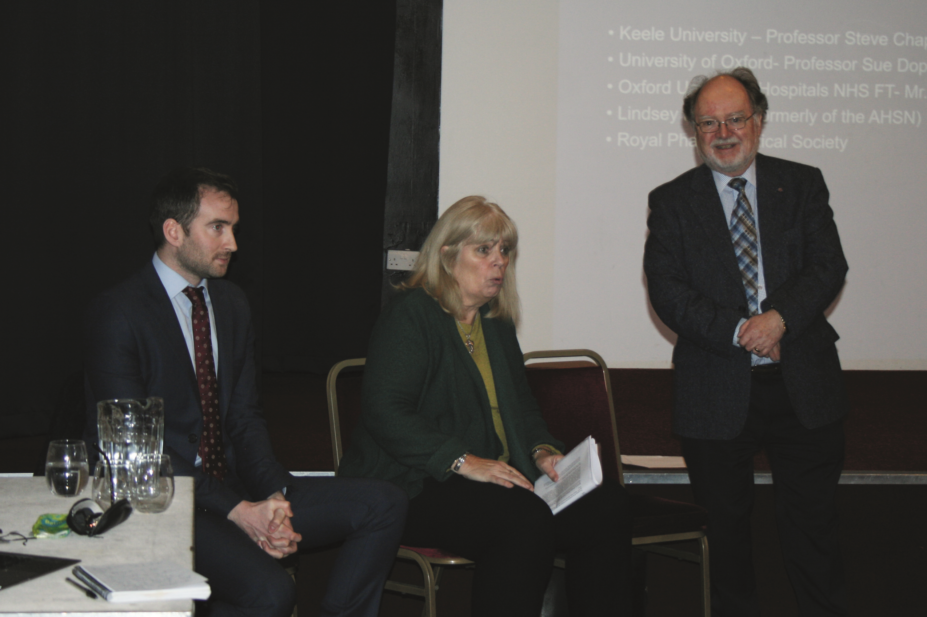
Corrinne Burns / The Pharmaceutical Journal
Falsified medicines present “a huge reputational risk for pharmacy”, Sue Kilby, chair of the Royal Pharmaceutical Society’s (RPS) Industrial Pharmacists Forum, told members of Thames Valley Local Practice Forum (LPF).
Kilby was speaking at Thames Valley LPF’s latest event, ‘The EU Falsified Medicine Directive (FMD) — implications for the dispensing of medicines’, held in Kidlington, Oxford, on 22 February 2018. The evening was chaired by Ian Simpson, who also chairs the RPS Retired Pharmacists’ Group and is on Thames Valley LPF’s steering committee.
“Falsified medicines are a real risk to patients, and a real threat to the pharmaceutical industry,” Kilby said. “If a patient receives a product that isn’t what it claims to be, the backlash could fall onto where they’ve picked that medicine up.”
Kilby added that falsification of medicines indirectly impacts upon employment in the legal pharmaceutical industry, with the potential for fewer jobs available if increasing volumes of falsified medicines enter the market. But the major concern from a pharmacist’s point of view, she emphasised, was patient safety.
“Falsified medicines don’t go through the appropriate quality, safety and efficacy process, so we can’t be assured that what we’re giving patients is safe, or clinically effective.
“It is really important that we ensure the product in the box matches what it says on the label,” she stressed.
Kilby provided an overview of how FMD implementation would work, from manufacturer to patient. Internet supply, she said, was something that pharmacists needed to be more aware of. Under FMD, all EU pharmacies registered with their national authorities — the MHRA in the UK — would display a logo identifying them as authentic. “We have to ensure that the people we interact with on a daily basis know which websites are safe for them to use,” she explained.
Kilby added that the RPS had worked to ensure that the public know how to identify a safe website.
Tight deadline for change
She also recognised that FMD implementation would reduce the threat from falsified medicines, but warned: “It’s an enormous task for pharmacies and also for industry, and we’ve got less than 12 months to implement it.
“Trying to make any change in that time is going to be incredibly tight.”
Bernard Naughton, a PhD student at Keele University and visiting researcher at the University of Oxford’s Saïd Business School, told members that the full extent of falsified medicines in the legal supply chain would only become apparent after FMD was implemented.
“At the moment there’s no systematic way to measure the volume of falsified medicines,” Naughton said, adding that suspicious medications are typically picked up by customs, or by pharmacists who notice something “not quite right” in a medicine’s colour, texture, or packaging.
He pointed out that the World Health Organization estimates that 1% of medicines in high-income countries are falsified; 10% in middle- and low-income countries; and greater than 50% online. But, he cautioned, until we systematically scan every drug, “we won’t know what the true prevalence is”.
Naughton, whose PhD research focuses on the digital screening aspect of FMD, gave an overview of how the decommissioning would work in community and hospital pharmacies. Then, speaking from his own experience of co-managing an FMD pilot measuring the effectiveness of medicines authentication technology to detect such medicines in a hospital trust, he identified a few remaining “obstacles” to streamlined decommissioning of medicines in hospital environments: how robot dispensing would work; the choice of where in the dispensing cycle to decommission; and poor authentication compliance by staff.
“The problem is unlikely to lie with the technology,” Naughton said. “It will be around compliance.” In the pilot, he said, only 66.3% of medicines were scanned. “FMD is a waste of money if people don’t prioritise scanning,” he advised. “Pharmacists are so busy, it is easy to miss the authentication step.”
Added safety benefits
However, FMD had the potential to bring added safety benefits beyond identification of falsified medicines, he continued.
“A 2D data matrix can hold additional information if it links to drug information.
“In Belgium, where authentication of drugs has been happening for about ten years, messages can be sent to the pharmacy when you scan a certain drug. For example, you can be told that there’s a manufacturer problem with this drug, and so stocks will be low in certain months. That gives you the impetus to contact the prescriber in advance and say ‘We need an alternative for this time period’.
“That’s not been spoken about for the UK, but it shows the potential,” he pointed out.
Another benefit of FMD, he added, would be increased robustness of drug recalls, and an extra safety check for expired medicines.
Naughton predicted that in future more over-the-counter (OTC) medicines might be added to the list of those that require authentication: “Personally, I’d like to see things like codeine-ibuprofen combination drugs added; this could be a way of tracking OTC use of these medicines.”
Both Kilby and Naughton agreed that while getting the UK FMD-ready by 9 February 2019 would be a challenge, the threat from falsified medicines was such that a robust authentication system was needed.
“There are financial implications to the implementation of FMD,” Kilby acknowledged. But, he warned, “the implications of not doing anything are much greater”.
You may also be interested in
Long service of members

Membership fees 2022
